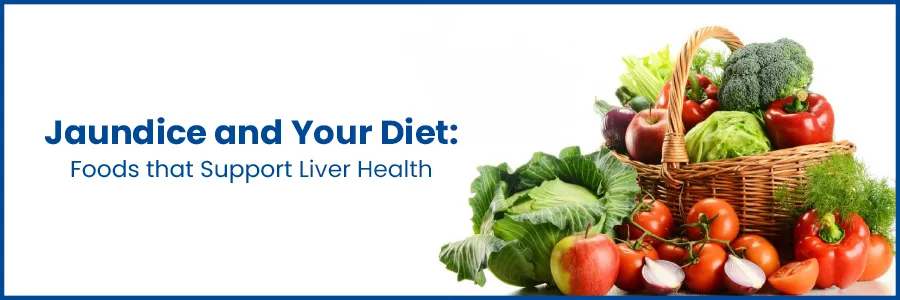- Cardiology 84
- Dermatology 45
- Endocrinology 33
- ENT 16
- Fertility 190
- Gastroenterology 78
- General-Medicine 81
- Gynecology 80
- Hematology 19
- Infectious-Diseases 33
- Neurology 52
- Oncology 34
- Ophthalmology 23
- Orthopedics 69
- Pediatrics 31
- Procedure 23
- Public-Health 144
- Pulmonology 59
- Radiology 8
- Urology 68
- Wellness 161
- Woman-and-child 77

Diet Plan for Jaundice Patient
Proper nutrition is crucial for managing jaundice by supporting liver function and aiding in recovery. A balanced diet reduces strain on the liver, promotes regeneration, and provides essential nutrients.
This includes easily digestible, low-fat, low-sugar foods, with an emphasis on hydration and nutrient-dense options.
Secure your health with a second opinion. Make informed decisions and book your appointment today!
Get A Second OpinionWhat is Jaundice?
Jaundice is a condition characterized by yellowing of the skin and the whites of the eyes. It occurs when there's a buildup of bilirubin, a yellow pigment produced by the breakdown of red blood cells, in the bloodstream. While jaundice itself is not a disease, it can be a symptom of an underlying health issue.
Diet Plan for Jaundice
Foods to Support Liver Health
- Incorporate plenty of fruits and vegetables rich in antioxidants such as berries, citrus fruits, spinach, and kale. This helps neutralize free radicals and reduce oxidative stress on the liver.
- Include high-fiber foods like whole grains, legumes, and nuts to promote healthy digestion and prevent constipation, which can worsen jaundice.
- Consume lean sources of protein such as fish, poultry, tofu, and legumes to support liver repair and regeneration.
- Opt for healthy fats like those found in avocados, olive oil, and nuts, which can help reduce inflammation and support liver function.
- Hydration is Key: Staying hydrated is essential for liver health. Drink plenty of water and avoid sugary beverages and excessive alcohol, as they can strain the liver and worsen jaundice symptoms.
Best Food for Liver Jaundice
- Cranberries, blueberries and grapes
- Citrus fruits – Lemons, limes
- Papaya and watermelon
- Pumpkin
- Sweet potato and yam
- Tomato
- Carrot and beetroot
- Ginger and garlic
- Cruciferous vegetables – broccoli, cauliflower, brussels sprouts
- Avocado
- Spinach and collard greens
Foods to Avoid For Liver Health
Here are the foods to avoid during jaundice, along with the best foods for liver health during jaundice.
- Limit consumption of processed foods, fried foods, and foods high in saturated and trans fats, as they can contribute to liver inflammation and damage.
- Reduce intake of refined sugars and sugary snacks, as they can increase insulin resistance and burden the liver.
- Avoid alcohol completely, as it can exacerbate liver damage and interfere with the liver's ability to metabolize bilirubin.
Ready to take control of your health journey? Book your appointment now and start your path towards wellness today!
Book an AppointmentConclusion
- While a balanced and nutrient-rich diet is essential for overall health, it becomes even more critical when dealing with jaundice or liver-related issues.
- Consult a healthcare professional to create a diet plan tailored to your condition and needs.
- Incorporating liver-supporting foods and making mindful dietary choices can contribute to your overall well-being and aid recovery.
- Remember that a healthy diet and medical treatment can significantly impact your journey toward better liver health.
Frequently Asked Questions
The liver is responsible for processing bilirubin, a waste product produced by the breakdown of red blood cells. Jaundice occurs when bilirubin accumulates in the bloodstream, causing yellowing of the skin and eyes due to liver dysfunction.
Yes, a healthy diet can play a significant role in supporting liver health and aiding in the recovery process for individuals with jaundice. Nutrient-rich foods and proper hydration can help the liver function more effectively.
Foods that help liver health include:
- Leafy greens (spinach, kale, collard greens)
- Cruciferous vegetables (broccoli, cauliflower, Brussels sprouts)
- Fruits rich in antioxidants (berries, citrus fruits, apples)
- Whole grains (brown rice, quinoa, whole wheat)
- Lean proteins (fish, skinless poultry, tofu, legumes)
- Herbal teas (dandelion root tea, milk thistle tea)
No, it's recommended to avoid alcohol if you have jaundice ultimately. Alcohol can further strain the liver and worsen the condition.
Antioxidants in foods like fruits and vegetables help protect liver cells from oxidative stress and inflammation. They can support the liver's detoxification processes and overall function.
Consult a healthcare professional to create a personalized diet plan tailored to your condition and needs. While general guidelines are helpful, an individualized approach is essential for adequate recovery.
It's essential to consult with a healthcare professional before taking supplements. While accessories such as milk thistle may benefit liver health, ensuring they are safe and suitable for your specific condition is essential.
The timeline for improvement varies based on individual health, the underlying cause of jaundice, and the extent of liver damage. Consistency with nutritional changes and medical treatment is critical for adequate recovery.

- Cardiology 2132
- Dermatology 168
- Endocrinology 135
- ENT 97
- Fertility 217
- Gastroenterology 232
- General 478
- General-Medicine 1685
- Gynecology 169
- Hematology 85
- Infectious-Diseases 208
- Neurology 207
- Oncology 345
- Ophthalmology 65
- Orthopedics 187
- Pediatrics 83
- Procedure 72
- Public-Health 209
- Pulmonology 126
- Radiology 13
- Second Opinion 311
- Urology 294
- Wellness 600
- Woman-and-child 447
Related Blogs
If you have any questions, please fill out the enquiry form or call us, and we will get back to you promptly.
040-68334455